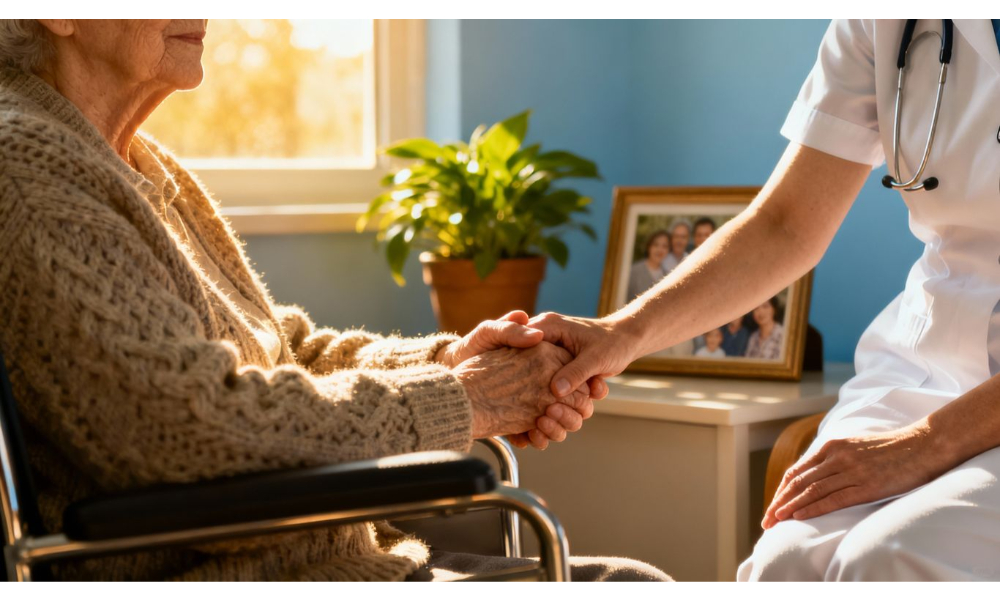Recognizing The Signs Of Nursing Home Abuse

It can be tough to know if a loved one is experiencing abuse or neglect in a nursing home. Sometimes the signs are obvious, but often they’re subtle and can be missed. Paying close attention is key.
Physical Indicators Of Mistreatment
Physical signs of abuse or neglect are often the most noticeable. These can include unexplained injuries, but also things that might seem minor at first glance. Keep an eye out for:
- Bruises, cuts, or welts: Especially if they appear in patterns or in places that are hard to explain.
- Broken bones: Fractures can happen, but repeated instances or those that don’t align with a fall history are concerning.
- Burns: These could be from cigarettes, hot liquids, or other sources.
- Changes in skin condition: Things like bedsores that aren’t being treated properly, or skin irritation from poor hygiene.
- Dehydration or malnutrition: Unexplained weight loss or signs of not drinking enough fluids.
Emotional And Behavioral Changes
Sometimes, the signs aren’t physical. A resident might start acting differently, and these changes can be a red flag. They might seem withdrawn, scared, or agitated. Some residents might develop new habits that are unusual for them. For instance, they could start mumbling more or rocking back and forth, behaviors that can sometimes be mistaken for dementia symptoms. Major behavioral changes can be a sign that something is wrong, even if the resident can’t or won’t say it directly. Other behavioral shifts to watch for include:
- Increased fear or anxiety, especially around certain staff members.
- Sudden withdrawal from social activities or conversations.
- Unexplained depression or mood swings.
- Hesitation to speak in front of caregivers.
Neglect And Unsanitary Conditions
Neglect is a common form of abuse, and it often shows up in the living environment and the resident’s personal care. It’s not always about direct harm, but about a failure to provide necessary care. Look for:
- Poor hygiene: Residents who consistently smell bad, have dirty clothes, or haven’t had their hair brushed.
- Unclean living spaces: Rooms that are messy, unsanitary, or filled with waste.
- Lack of necessary medical equipment: Not having walkers, glasses, or hearing aids when needed, or having them broken and not replaced.
- Inadequate food or water: Meals that are consistently skipped, or residents who seem constantly thirsty.
- Failure to address medical needs: Wounds that aren’t cleaned, medications that are missed, or calls for help that go unanswered.
If you notice any of these signs, it’s important to investigate further. Your vigilance can make a big difference in protecting your loved one and seeking justice if abuse has occurred. Understanding these indicators is the first step toward addressing potential problems and exploring options for compensation.
Understanding Your Legal Options For Nursing Home Abuse Compensation
When a resident suffers abuse or neglect in a nursing home, understanding the legal avenues for compensation is a significant step toward seeking justice. It’s not always straightforward, but knowing the basics can help families pursue accountability.
Establishing Liability In Abuse Cases
Determining who is responsible for the harm is the first hurdle. Liability can fall on several parties, depending on the circumstances. This might include:
- The nursing home facility itself: If the facility has a pattern of neglect or inadequate training, they can be held responsible.
- Individual staff members: A specific caregiver or employee who directly caused the abuse or neglect.
- Management or ownership: If poor management practices or a lack of oversight contributed to the situation.
Proving negligence is often key; this means showing that the facility or staff failed to provide the expected standard of care, and this failure directly led to the resident’s injuries or suffering. Gathering evidence is vital here, as discussed in other sections of this guide. For assistance with this complex process, consider consulting with experienced nursing home abuse lawyers in Cleveland, OH [26cb].
Types Of Damages Available
If a claim is successful, compensation, often called damages, can be awarded to help cover losses. These damages generally fall into a few categories:
- Economic Damages: These are quantifiable financial losses. They can include medical bills for treating injuries, costs for future care, and lost income if the abuse impacted the resident’s ability to earn.
- Non-Economic Damages: These cover less tangible losses, such as pain and suffering, emotional distress, loss of enjoyment of life, and the physical disfigurement resulting from abuse.
- Punitive Damages: In cases where the abuse was particularly egregious or intentional, courts may award punitive damages. These are not meant to compensate the victim but to punish the wrongdoer and deter similar conduct in the future.
The Statute Of Limitations For Claims
Every state has a time limit, known as the statute of limitations, within which a lawsuit must be filed. This deadline varies by state and the type of claim. Missing this deadline means losing the right to seek compensation, no matter how strong the case might be. It is imperative to act promptly to ensure all legal options remain available. Understanding these timeframes is a critical part of the process.
Gathering Evidence For Your Nursing Home Abuse Claim
Documenting Injuries And Incidents
When you suspect abuse or neglect, the first step is to start documenting everything. This means keeping a detailed record of any injuries you notice, no matter how small they seem. Take pictures of bruises, cuts, or bedsores. Note the date and time you observed the injury and describe it as accurately as possible. It’s also important to write down every incident that raises concern. Did a resident fall? Was medication missed? Who was present, and what was said? This meticulous record-keeping forms the backbone of any successful claim.
Collecting Witness Statements
Other residents, staff members, or even visitors might have seen something. If possible and appropriate, try to get statements from anyone who witnessed concerning behavior or conditions. Sometimes, a simple conversation can yield important information. If a staff member expresses concerns, ask if they would be willing to put their observations in writing. Family members who visit regularly should also keep detailed notes of their observations. These eyewitness accounts can corroborate your own findings and add significant weight to your case.
Preserving Medical Records
Medical records are vital pieces of evidence. They can show a pattern of injuries, untreated conditions, or improper care. You have a right to access your loved one’s medical records. Request copies of all relevant documents from the nursing home and any treating physicians. This includes:
- Admission and discharge summaries
- Physician’s orders
- Nurses’ notes
- Medication administration records
- Treatment plans
- Incident reports
These records can provide objective proof of the care provided, or the lack thereof, and are indispensable when building a case for compensation.
The Process Of Seeking Nursing Home Abuse Compensation
When a resident has experienced abuse or neglect in a nursing home, pursuing compensation involves several distinct stages. Understanding this process can help families navigate the complexities of seeking justice and financial recovery for the harm caused. The path to compensation typically begins with formal reporting and culminates in either a settlement or a trial.
Filing A Formal Complaint
The initial step often involves lodging a formal complaint. This can be directed towards the facility itself, state licensing agencies, or adult protective services. Documenting the concerns thoroughly is paramount. This complaint serves as an official record of the issues and can trigger an investigation into the facility’s practices. It’s important to be specific about the incidents, dates, and individuals involved. For more on the types of abuse that can occur, understanding elder abuse categories is helpful.
Negotiating A Settlement
Many nursing home abuse cases are resolved through settlement negotiations rather than going to trial. This involves discussions between the claimant’s legal representative and the nursing home’s insurance company or legal team. The goal is to reach an agreement on a compensation amount that both parties find acceptable. Factors influencing settlement talks include the severity of the injuries, the strength of the evidence, and the potential costs of litigation. A settlement avoids the uncertainty and expense of a trial.
Litigation And Trial Procedures
If a settlement cannot be reached, the case may proceed to litigation. This involves filing a lawsuit and engaging in formal legal procedures. These can include:
- Discovery: Exchanging information and evidence with the opposing party.
- Motions: Legal requests made to the court.
- Pre-trial Conferences: Meetings with the judge to discuss the case.
- Trial: Presenting evidence and arguments before a judge or jury.
Throughout this process, adherence to legal timelines and procedures is critical. The legal framework for these claims often relies on establishing the nursing home’s standard of care and how it was breached. A trial is the final stage where a judge or jury makes a binding decision on liability and damages.
Choosing The Right Legal Representation
When pursuing compensation for nursing home abuse, selecting the right legal help is a big step. It’s not just about finding any lawyer; it’s about finding someone who really gets what you’re going through and knows how to fight for your rights. This isn’t a simple car accident case; elder abuse claims have their own set of challenges.
Experience With Elder Abuse Litigation
Look for attorneys who have a solid history specifically with nursing home abuse cases. This means they understand the laws that protect residents and have dealt with the types of evidence and arguments common in these situations. They’ll know how to build a strong case, which often involves:
- Investigating the facility’s practices.
- Gathering medical records and expert opinions.
- Understanding the specific state laws regarding elder care.
An experienced lawyer can spot details others might miss, making a significant difference in the outcome. They’ve likely seen similar situations before and know the best paths forward. You can often find this information on their website or by asking directly during an initial consultation. It’s important to find someone who has successfully represented individuals with legal standing in similar matters.
Understanding Attorney Fees And Costs
Most lawyers who handle these types of cases work on a contingency fee basis. This means they don’t get paid unless you win your case, either through a settlement or a court verdict. Their fee is then a percentage of the compensation you receive. This arrangement makes legal help accessible, as you don’t have to pay large sums upfront. Always ask for a clear explanation of how fees are calculated and what costs might be involved beyond the attorney’s fee, such as court filing fees or expert witness expenses. Make sure you get this in writing.
The Importance Of Communication
Good communication is key. You need to feel comfortable talking to your attorney and their team. They should be responsive to your questions and keep you informed about the progress of your case. A lawyer who explains things clearly and regularly updates you builds trust. Don’t hesitate to ask about their communication style and how often you can expect updates. Feeling heard and understood by your legal team is just as important as their legal skill.
Preventing Future Nursing Home Abuse
While seeking compensation for abuse is important, taking steps to prevent it from happening in the first place is equally vital. Proactive measures can significantly reduce the risk of mistreatment for residents.
Choosing A Reputable Facility
Selecting the right nursing home is the first line of defense. It’s not enough to just look at the brochures; a thorough investigation is necessary. Consider the following:
- Staff-to-Resident Ratios: A facility with adequate staffing is more likely to provide attentive care. Low ratios can strain resources and lead to rushed or neglected care.
- Inspection Reports: Review state and federal inspection reports. These documents detail any violations or complaints filed against the facility. You can often find these online through state health departments or the Medicare website.
- Staff Turnover: High staff turnover can be a red flag, suggesting underlying issues with management or working conditions that might impact resident care. A stable and experienced staff often indicates a better-run facility.
- Resident and Family Feedback: Talk to current residents and their families if possible. Their firsthand experiences can offer insights that official reports might not capture. Look for signs of a positive and caring environment.
Regularly Visiting And Monitoring Care
Once a resident is in a facility, ongoing observation is key. Frequent, unannounced visits can provide a more accurate picture of daily life and care quality. Pay attention to:
- The Resident’s Well-being: Observe changes in their physical condition, mood, and behavior. Are they clean? Are they receiving their medications on time? Do they seem distressed?
- Staff Interactions: Watch how staff members interact with residents. Are they respectful, patient, and responsive? Or do they seem rushed, dismissive, or rough?
- Facility Conditions: Note the general cleanliness and maintenance of the facility. Unsanitary conditions or disrepair can be indicators of neglect.
Reporting Concerns Promptly
If you notice anything that seems amiss, don’t hesitate to speak up. Early reporting can often address issues before they escalate into serious abuse or neglect. Approximately 1 in 24 elder abuse cases are officially reported, highlighting the need for more vigilance [050e].
- Communicate with Facility Management: Start by discussing your concerns with the charge nurse or facility administrator. Document these conversations, including dates, times, and what was discussed.
- Contact State Agencies: If your concerns are not adequately addressed by the facility, report them to your state’s Adult Protective Services or the state agency responsible for licensing and regulating nursing homes.
- Seek Legal Counsel: For serious allegations of abuse or neglect, consulting with an attorney specializing in elder abuse cases is advisable. They can guide you through the process of seeking justice and compensation, and help ensure that facilities are held accountable for their actions. Federal law prohibits facilities from employing individuals with a history of abuse or neglect [b36f], and legal action can help enforce these regulations.











